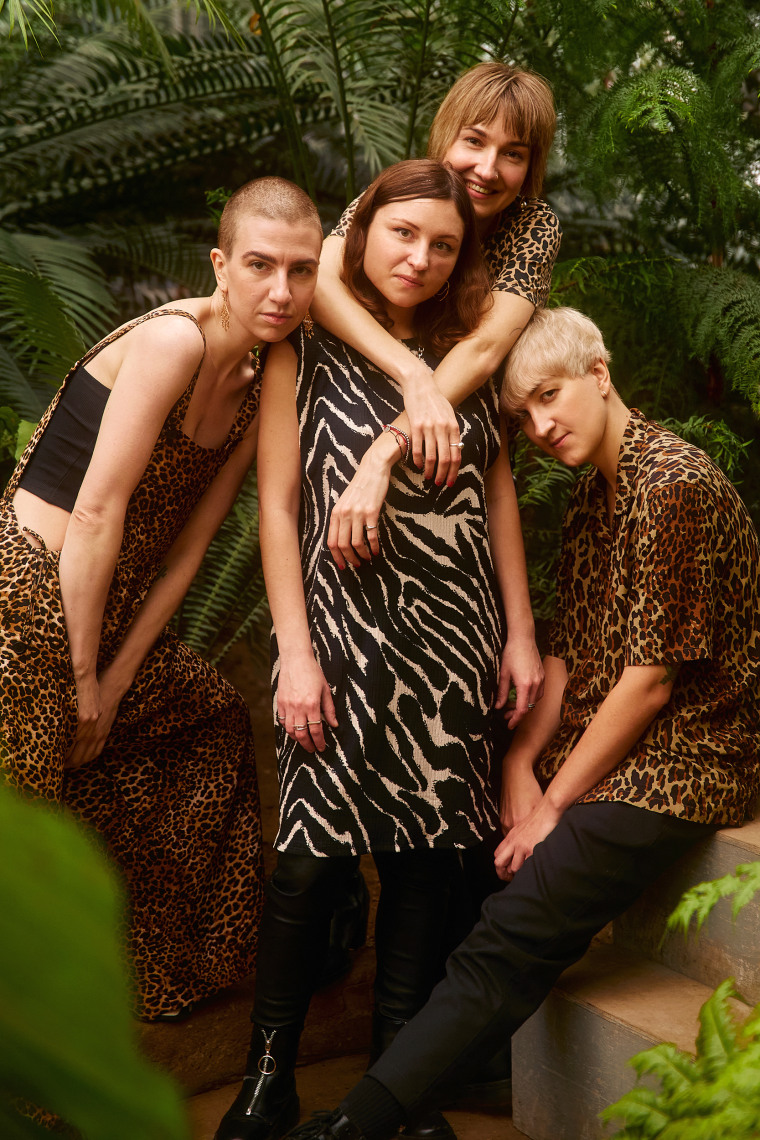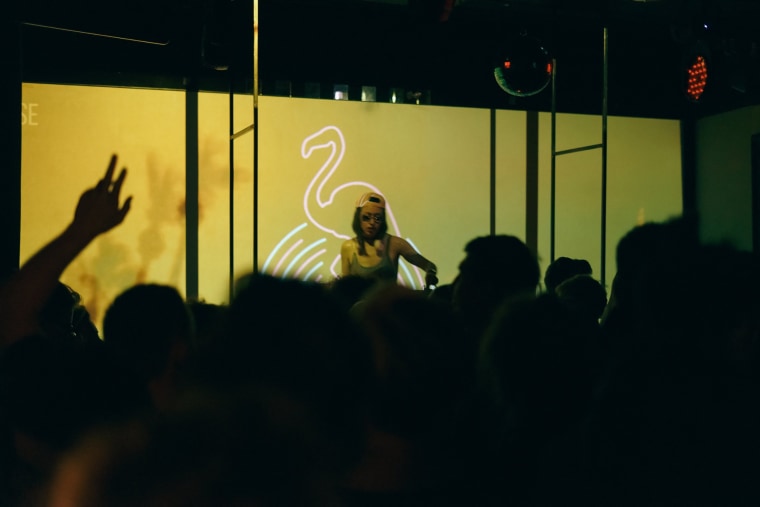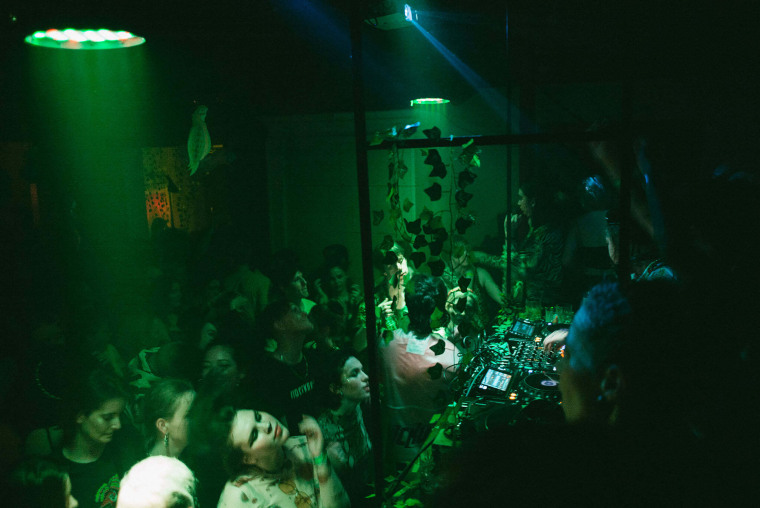When Lisa Androshina threw her first lesbian party in Moscow in 2017, she had low expectations.
“We wanted to just gather with our friends and just listen to cool music,” Androshina, 34, told NBC News. “We didn’t plan to do anything serious.”
She booked a bar that she said was often empty and invited her friends and some DJs. After a few parties, her event, called LVBZ, grew in popularity.

Androshina, who lives in Moscow, said about 500 people now attend the quarterly LVBZ nighttime dance, which features DJs from around the world.
Despite the government’s anti-gay restrictions and the country’s conservative views on LGBTQ issues, some lesbian, gay, bisexual, transgender and queer Russians, like Androshina, are publicly sharing their identities and forming community, particularly in the country’s largest cities. This has spawned a cultural shift, albeit a small and partially underground one.
“We’re not hiding,” Androshina said. “We’re openly speaking about who we are now.”
‘Tired of being targeted’
In 2013, Russia passed a law that bans distributing information on LGBTQ issues and relationships to minors. Known as the “gay propaganda law,” the legislation states that any act or event that authorities deem to promote homosexuality to those under 18 is a finable offense.
The legislation has had a far more sinister impact than just a financial one: After it passed, anti-LGBTQ violence in the country increased, according to a 2018 report from the international rights group Human Rights Watch. A 2019 poll from the Russian LGBT Network, a Russian queer advocacy group, found 56 percent of LGBTQ respondents reported experiencing psychological abuse, and disturbing reports have emerged in recent years of the state-sanctioned detention and torture of gay and bisexual men in Chechnya, a semiautonomous Russian region. Just last year, a survey found that nearly 1 in 5 Russians reported wanting to “eliminate” gay and lesbian people from society.
“I don’t think Russian society is homophobic on its own,” Svetlana Zakharova, a boardmember of the St. Petersburg-based Russian LGBT Network, said. “The law’s inspiring homophobic hatred.”
Zakharova said younger residents are less trusting of the Russian government and are more accepting of LGBTQ people. She said that despite the “gay propaganda law,” more people from across the country are attending public, LGBTQ-focused events.
“Many people are tired of being targeted constantly, and they want to change something,” she said.
Creating ‘beautiful things’ amid fear
News articles, TV segments and documentary films about LGBTQ life in Russia tend to chronicle the challenging, and at times violent, experiences of the queer people that live there. This media narrative, even if accurate, contributes to the difficulty of being LGBTQ in Russia, according to Nikita Andriyanov, who lives in Moscow and co-hosts a podcast, roughly translated in English as “wide open,” about LGBTQ life and culture in Russia.
“It is not easy, and it’s not fun to be a gay person here,” he said.
Andriyanov, however, is among those trying to change the narrative. He said smaller media outlets, like his own, are helping to shape Russia’s emerging LGBTQ community. To avoid fines from the “gay propaganda law,” he said he adds a disclaimer to his podcast stating that it is for people over 18. And if the government were to fine him, despite the disclaimer, he said, people in the LGBTQ community would help support him.
“Once you are ready to accept the fact [that you are LGBTQ] and try to fight it, you become an activist,” Andriyanov said. “[There’s] that extra responsibility.”
Sasha Kazantseva, a 34-year-old lesbian living in Saint Petersburg, is also trying to change the narrative and help build community through media. In 2018, she created a digital magazine about queer Russian culture called O-Zine. She said she wanted to publish the magazine, in part, to counter the news coverage focused on the difficulty of being gay in Russia. The publication features queer art and culture stories, as well as positive articles about people in the community. She said she hopes O-Zine helps empower LGBTQ Russians to feel proud of their identities.
“When you’re a queer person and you live in a very homophobic country,” she said, “it makes it rather hard to just feel connection to other people.”
She’s trying to change that — and she said O-Zine has helped to document the progress that has been made so far. When the publication first launched, Kazantseva said, finding openly LGBTQ people to feature was difficult. Now, she added, Russians living in larger cities are open, and at times eager, to share their stories.
“Paradoxically [the gay propaganda law] helps the process of self-reflection of who we are, how we live as a community, how we can feel proud of who we are,” Kazantseva said.
She said both a drive to fight governmental restrictions and access to social media has slowly fortified the community over the past several years.
Despite collaborating with high-profile Russian creators and celebrities, O-Zine has not been fined under the country’s propaganda law. The magazine has avoided issues because it is independent and not an official media organization, according to Kazantseva.
“When you live under this risk daily, you start to just not care,” said Kazantseva, who like Zakharova said the younger generation is more progressive and open. “We can be arrested the next day, but let’s do what we want to do, and let’s create beautiful things.”
She did, however, note that the situation is drastically different in smaller Russian towns, where she said it’s nearly impossible — if not deadly — for queer people to form community.
“In Moscow and in St. Petersburg, big cities, it’s possible for us to have friendly spaces,” Kazantseva said. “For smaller cities [in] Russia, it’s nearly impossible, because people know each other, and people are less tolerant.”
Andriyanov, who moved from the vast province of Siberia to Moscow after college, agreed.
“It is not really that dangerous for me to be openly gay as it would have been if I grew up, if I stayed in [Siberia],” Andriyanov said. “I don’t think it would have been possible for me to reach that level of openness about my identity.”
He said living in a large city has helped him to accept his sexuality, and added that he would likely be in danger if he stayed in his hometown and lived openly as a gay man.
Creative ‘freedom’
A few films in Russian cinema are also reflecting the shift. The 2019 film “Beanpole” is a drama about a romance between two women in the former Leningrad that is set during World War II. Another 2019 film titled “Outlaw” is widely regarded as the first Russian film to feature a transgender character. “Outlaw” weaves the story of a gay teenager in modern-day Moscow and a transgender dancer in 1980s Soviet Union.
“‘Outlaw’ is about the impossible, about freedom — internal and external,” Ksenia Ratushnaya, the film’s director and screenwriter, said.
Ratushnaya, who lives in Moscow, said she thought the propaganda law would prevent her from screening “Outlaw” in Russia. She was nonetheless able to secure a governmental certificate to show the film in theaters, with the proviso that she edit out curse words and a few seconds of a sex scene involving a priest. That scene was flagged by government censors as breaking another law prohibiting offense against religious people.
Even though Ratushnaya was able to produce and release a film that featured LGBTQ characters without facing legal challenges, she said her film was not shown widely in Russia. Just 10 theaters agreed to screen it to the public, far fewer than most films, according to Ratushnaya. She said she believes many theater operators were simply too afraid to show it.
“I want people to have access to any information that they want,” said Ratushnaya, who added that it’s a battle to navigate the laws and create art. “Freedom, for me, is extremely important.”
‘You can move slowly to the light’
Androshina said the cultural shift she has observed, including the success of her lesbian party, has made her hopeful for the future. Currently, however, she’s not without concerns, ranging from her inability to marry or adopt children to fear for her physical safety as an out lesbian.

She also noted that because her party, LVBZ, is for people over 21, the event should be legal but added that the propaganda law and its application is not entirely clear to her. She said she is constantly balancing potential threats, including legal ones, and her dedication to creating an open and celebratory space for LGBTQ Russians. But despite all the challenges, she stressed that her experience as an out person in Russia may surprise some inside and outside her country.
“People think that it's too bad, and [we all] really have to hide without doing anything. That's not true,” she said. “We’re actually moving in a good direction.”
“You may have some fears,” she added, about being openly LGBTQ in Russia. “At the same time, there is a tunnel. You can move slowly to the light; you can make an impact.”
